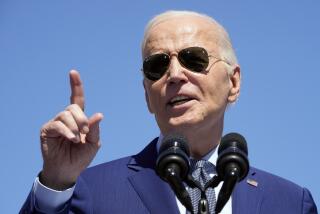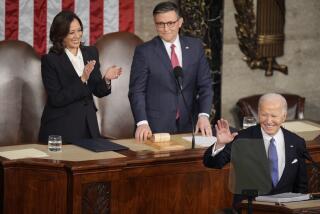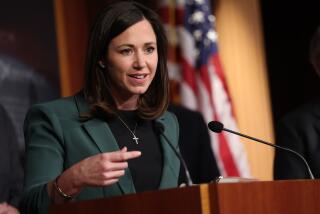GOP plans to watch State of the Union closely
Tuesday’s State of the Union address will be the first test of whether President Obama’s post-election shift to a more centrist course is more than symbolic, Republicans said Sunday.
“We’re going to find out beginning next week … how much of this he really means,” Senate Minority Leader Mitch McConnell of Kentucky said on “Fox News Sunday.” “It is kind of a trust-but-verify moment. Let’s see if he’s really willing to do it, and if he is, I think he’ll find a lot of help among Republicans in Congress.”
After his party was dealt an electoral blow in November, Obama embraced a compromise that extended the President George W. Bush-era tax cuts, retooled his West Wing to include more moderate voices — such as his new chief of staff, William Daley — and made new overtures to the business community.
His polls have rebounded on the eve of his second State of the Union address, passing the 50% threshold in a series of major surveys.
Addressing supporters in a video message released Saturday night, Obama said his speech Tuesday would focus on creating jobs and American competitiveness, as well as the nation’s deficit challenges.
Though calling for some budget cuts, Obama also is expected to call for additional spending on infrastructure and education. That raised red flags for Republicans.
“This is not a time to be looking at pumping up government spending in very many areas,” McConnell said.
“When the president talks about competitiveness, sure, we want America to be competitive,” Rep. Eric Cantor (R-Va.) said on NBC’s “Meet the Press.” But “we want to cut and grow.”
Cantor, leader of the new House Republican majority, said Republicans would press for serious spending cuts in response to the expected vote this spring on raising the nation’s debt limit.
On Thursday, a group of conservative House Republicans and Sen. Jim DeMint (R-S.C.) unveiled a spending plan that would cut $2.5 trillion from the federal ledger. Republicans more broadly campaigned in 2010 on returning spending to 2008 levels, a proposal that will be debated this week in the House.
First, though, Republicans pushed forward a vote to repeal Obama’s healthcare overhaul law. It passed the House on Wednesday, and Senate Majority Whip Richard J. Durbin (D-Ill.), also appearing on Fox, acknowledged that “it’s possible we’ll face that vote,” despite Democrats’ objections, if Republicans move it as an amendment.
In that case, said Sen. Charles E. Schumer (D-N.Y.), Democrats would respond by calling for votes on specific portions of the law that are popular.
“In the end, their repeal bill is going to be so full of holes it looks like Swiss cheese,” he said on CBS’ “Face the Nation.”
Sen. John McCain supported a repeal vote in the Senate, adding that there was already agreement with Democrats on ways to improve the law.
McCain, Obama’s rival in the 2008 election, also praised the president’s shift in tone.
“I think there’s common ground because I think the president realizes, as a result of the November elections, that the American people have a different set of priorities, and so we should seize that opportunity for the good of the country,” he said.
Calls for unity have manifested themselves in a move, largely initiated by Democrats, to break from the tradition of sitting along party lines during the speech. Durbin, who will sit with his new Republican colleague, Sen. Mark Kirk (R-Ill.), joked, “I’m bringing the popcorn. He’s bringing a Coke with two straws.”
“I don’t have a date,” Sen. Kay Bailey Hutchison (R-Texas) joked on ABC’s “This Week.”
“I’m available,” Sen. Kent Conrad (D-N.D.) responded.
McCain said he would sit with New Mexico Democrat Tom Udall and that he hoped the new arrangement would cut down on unnecessary interruptions that he said distracted from the speech.
But McConnell said the symbolism was overblown.
“The American people are more interested in actual accomplishments on a bipartisan basis in the next six to nine months than they are with the seating arrangements in the State of the Union,” he said.
More to Read
Get the L.A. Times Politics newsletter
Deeply reported insights into legislation, politics and policy from Sacramento, Washington and beyond. In your inbox three times per week.
You may occasionally receive promotional content from the Los Angeles Times.







